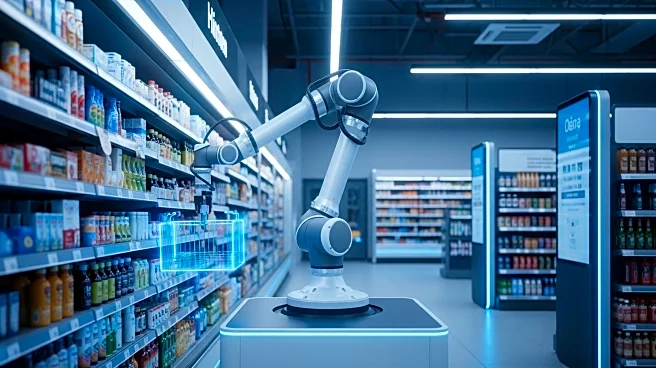What is the story about?
What's Happening?
Convenience store retailers are increasingly turning to artificial intelligence (AI) and robotics to tackle persistent workforce challenges, such as hiring and retention. Companies like Alimentation Couche-Tard are investing in AI platforms to streamline operations and reduce labor hours. These technologies help automate routine tasks, allowing staff to focus on customer engagement. AI tools are also being used to optimize workflows, predict staffing needs, and streamline the hiring process through automated applicant screening and predictive analytics. Additionally, robotic-operated stores like VenHub are emerging, offering fully automated shopping experiences without in-store employees. This shift towards automation is seen as a way to enhance efficiency and safety, particularly in high-risk environments like gas stations and convenience stores.
Why It's Important?
The integration of AI and robotics in convenience stores represents a significant shift in the retail industry, addressing labor shortages and high turnover rates. By automating mundane tasks, these technologies free up human resources for more strategic roles, potentially reducing operational costs and improving customer service. The use of AI in hiring processes can lead to better candidate matches and lower employee churn, which is crucial in a tight labor market. Moreover, robotic stores like VenHub enhance safety by eliminating the risk of violent crime against workers. This technological transformation could set a precedent for other retail sectors, driving a broader adoption of AI and robotics in the industry.
What's Next?
As AI and robotics continue to evolve, convenience stores are likely to further integrate these technologies into their operations. Retailers may expand the use of AI for more complex tasks, such as inventory management and customer analytics. The success of robotic stores like VenHub could lead to more widespread adoption of fully automated retail models. However, challenges remain, including the initial costs of technology implementation and the need for employee training. Retailers will need to balance technological advancements with human elements to ensure a seamless transition and maintain customer satisfaction.
Beyond the Headlines
The shift towards AI and robotics in convenience stores raises ethical and cultural questions about the future of work. As automation reduces the need for human labor, there is a potential impact on employment opportunities in the retail sector. This transition may require a reevaluation of workforce roles and the development of new skills among employees. Additionally, the reliance on technology for safety and efficiency could influence consumer perceptions of retail environments, potentially reshaping shopping behaviors and expectations.














